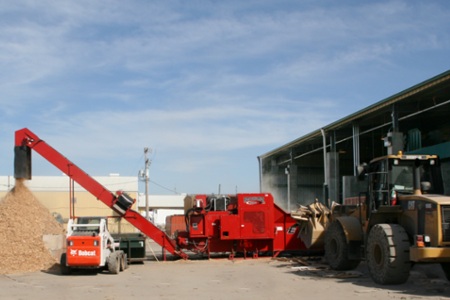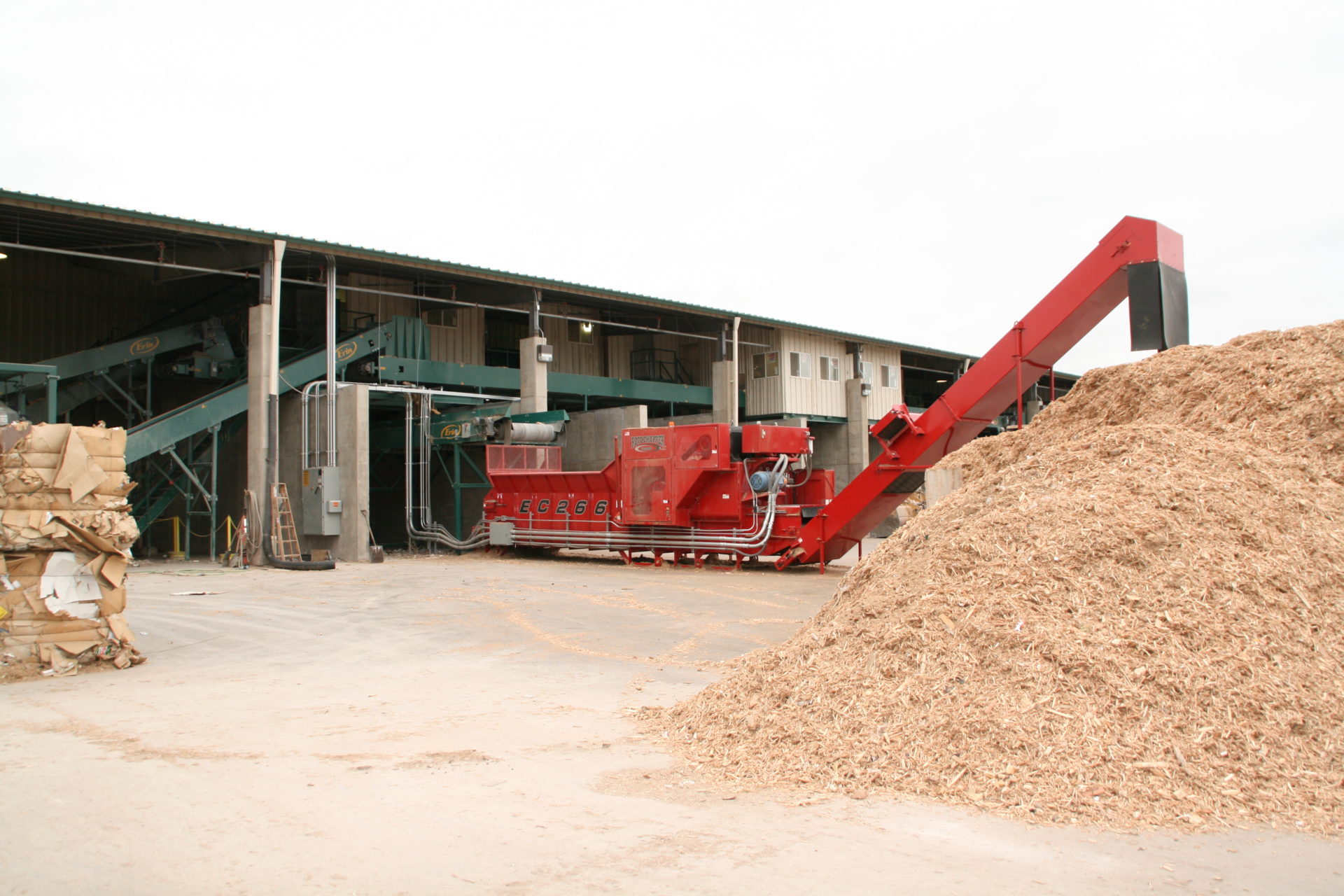
Minnesota Construction Waste Handler Expands Its Recovery Output with Rotochopper Equipment
“Green doesn’t happen overnight; it happens daily… ” -Dem-Con Companies,Shakopee, MN
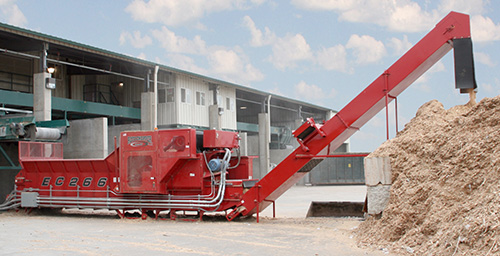
Dem-Con currently recovers wood fiber, asphalt shingles, ferrous and non-ferrous metals, aggregates, and other recyclable materials—at least 50 percent of all construction debris, with a goal of exceeding 75% in the near future. (The company’s recovery numbers are posted monthly on their website at www.dem-con.com.) But as they stress, the growth of their green practices has not simply happened overnight. It has required careful planning and collaboration with government agencies, equipment manufacturers, waste haulers, and the end users of recovered resources.
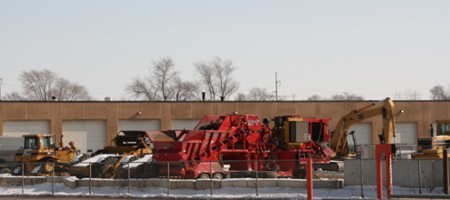
That is one reason, he says, they turned to Rotochopper, Inc. In the spring of 2008, Dem-Con added an RG-1 to their equipment fleet and began recycling tear-off shingles and manufacturer’s shingle scrap. Currently, Dem-Con is expanding its shingle recycling services, as they are taking on more custom grinding jobs for other companies with shingle waste in Minnesota, Wisconsin, Iowa, and Oregon. Haus stresses that steady uptime is particularly important for custom grinding jobs. “When we are hundreds of miles from our operating facility, we can’t afford downtime to apply hardfacing or perform other major wear-related maintenance. We contract by the ton, so we want to cut maintenance costs and time as much as possible.” He notes that the wear costs they are getting from their RG-1 allow Dem-Con to stay very competitive on pricing when bidding for shingle grinding contracts.
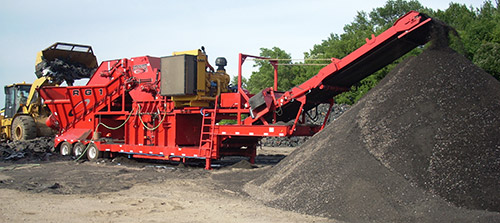
Shortly after Dem-Con began recycling shingle waste, they completed construction of a state of the art sorting system to process the C & D materials they receive at their Shakopee, MN facility. Through mechanical and manual separation, they recover wood fiber, cardboard, asphalt shingles, ferrous and non-ferrous metals, aggregate, and other valuable resources. Materials that cannot currently be recovered are sent to the landfill that Dem-Con operates. The fines screened out prior to the grinding process—sheet rock dust, metal shavings, dirt, small wood particles, and other debris—provide a suitable alternative daily cover (ADC) for their landfill.
They process the sorted wood fiber with a Rotochopper EC-266 electric grinder that operates in-line with their sorting line. The processed wood fiber is sold as boiler fuel. “The EC-266 is a great machine for sorted C & D,” says Haus. “It’s operating all day, every day. It’s providing a finished boiler fuel product our customers like.” Haus also notes that the machine is the right size for their sorting line and the periodic batch feeding that they do. “Throughout the planning phase, the Rotochopper staff worked with us to make sure we’d have the right size machine to keep our costs low and our production steady. The EC-266 also gives us room to grow as we increase our recycling output.”
C & D | Sorted C & D | Boiler Fuel from C & D |
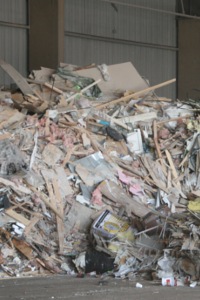 | 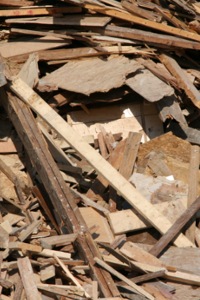 | 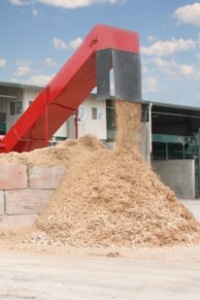 |
Dimensional lumber, steel, concrete, aluminum, etc. | Dimensional lumber, OSB board, plywood, etc. | 3-inch minus wood fiber free of metal & other contaminants |
With their combination of materials recovery, on-site recycling, and responsible landfill practices, Dem-Con exemplifies the daily commitment needed to achieve greener solutions. “Successfully recovering resources from commingled waste requires that every part of the system operates efficiently and effectively, from each employee to each piece of equipment,” says Haus. “Downtime must be minimized, and product quality is crucial.” Because Dem-Con sells their sorted wood fiber for boiler fuel, they must ensure that it is free of not only contaminants such as paint, stain, nails, and other metals, but also over-sized pieces. The same quality control procedures apply to the asphalt shingles Dem-Con processes and sells as a replacement for virgin asphalt cement (AC).
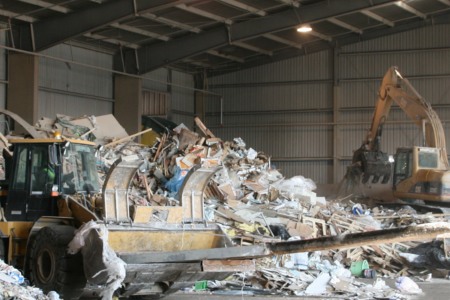
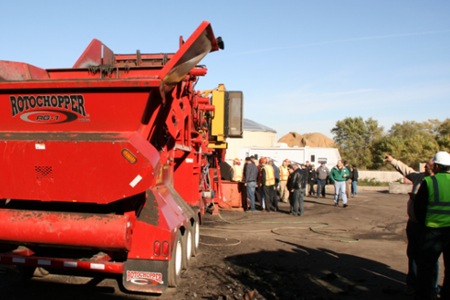
when people see material leaving the site on its way to the end markets, it all comes together. The grinding we do is just one part of our recovery efforts, but it’s one of the processes that interests people most. Those who visit our site ask the most questions about quality, quantities, and durability of the equipment.”
This increased awareness of their greener practices is having an immediate impact on relationships with their customers, industry partners, and community. Dem-Con Companies believes in an integrated solid waste management approach to waste handling. Included in this practice is prevention, recycling, and a responsible disposal solution for those materials that cannot be recovered. “The first thought someone has of our business is that of a landfill, not a recovery and recycling company. This mentality is changing, and those who have visited our site understand that there is a lot more to our process than just landfilling,” Haus states. “Even though waste handling companies perform a valuable and necessary service to the public, they often receive an unfair reputation based on practices that occurred decades ago which have been replaced with sustainable solutions.”
